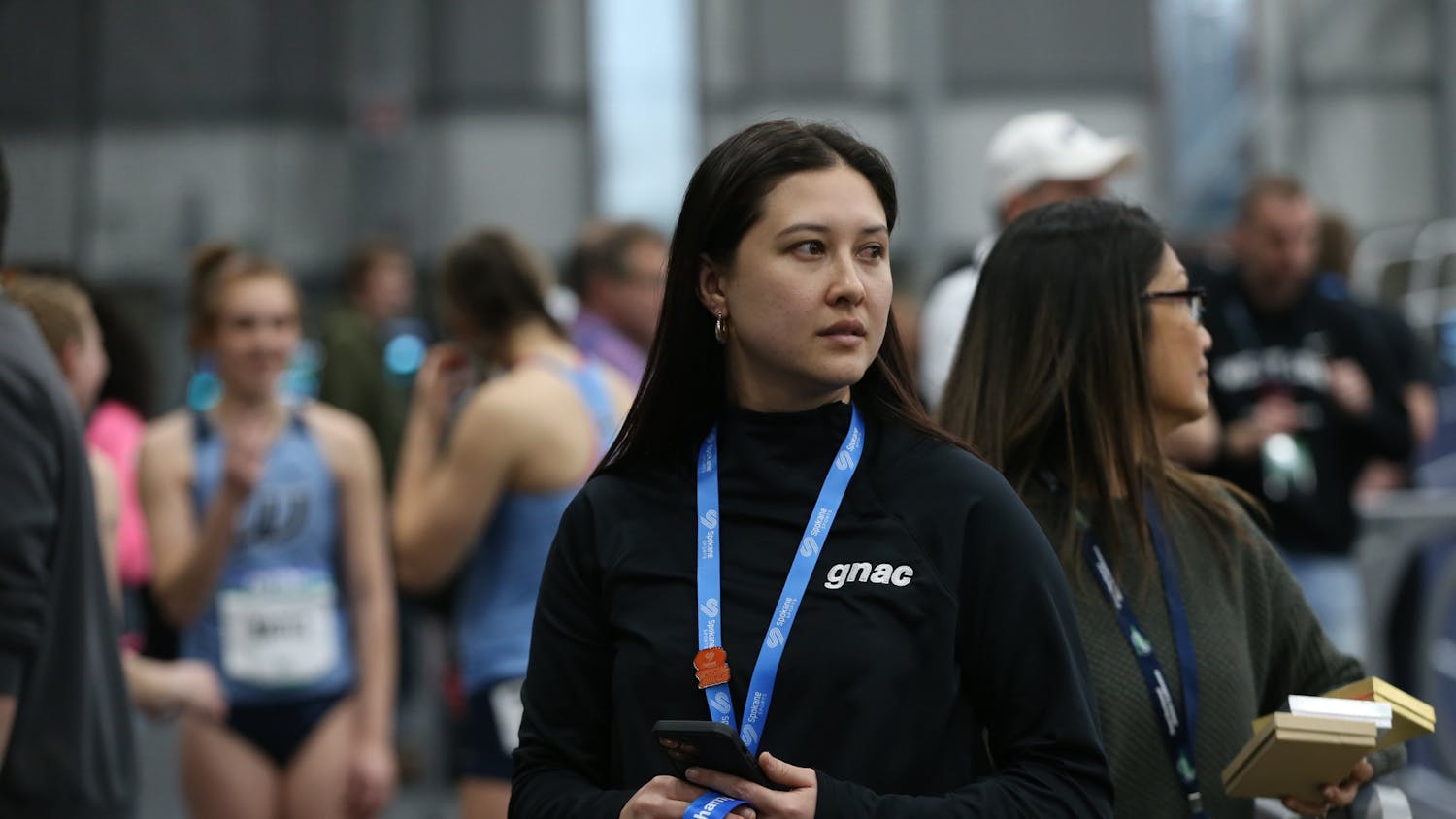[caption id="attachment_9826" align="aligncenter" width="486"] From left to right: International students Mayu Moriya, Megumi Akatsu, Ami Hosoya and Reiko Goto sit in front of the Atrium on May 27. // Photo by Matthew Pearson
[/caption]
The number of international students pursuing degrees at Western has remained fairly stable, with 273 international students from 35 countries enrolled on campus in 2015.
This comes on the heels of The Wall Street Journal reporting on a nationwide drop in the enrollment of these students, specifically highlighting Eastern Washington University’s drastic decline. At Eastern, enrollment for international and foreign students has dropped by nearly half, as the university slashed the number of staff and students from exchange programs, particularly from Saudi Arabia.
Richard Bruce, director of the International Student & Scholar Services, said the number of international students from Saudi Arabia's programs have decreased because of the economy and low oil prices. This has caused Saudi Arabia to cut back on scholarships and sending Saudi students home as a result, Bruce said.
“We’ve heard that some of the community college programs had a big dip in their numbers, mostly the Saudi students,” Bruce said. “Some have lost two or three hundred students.”
International students make up about 2 percent of Western’s total student body and Western’s numbers are lower compared to other schools in Washington. The University of Washington enrolled over 7,000 international students in 2014 compared to Western’s 273 in 2015. The lower numbers are in part because Western does not recruit internationally like other schools do, Bruce said.
Three specific international student programs at Western allow its numbers to remain stable: the International Student & Scholar Services, the Intensive English Program and the Asia University America Program.
Degree-seeking international students have the same college application process as domestic applicants, Bruce said. However, students must handle visas, residency and must take at least 12 credits for three consecutive quarters before returning to their home country. International students pay more tuition than Washington residents, comparable to out-of-state student costs.
From left to right: International students Mayu Moriya, Megumi Akatsu, Ami Hosoya and Reiko Goto sit in front of the Atrium on May 27. // Photo by Matthew Pearson
[/caption]
The number of international students pursuing degrees at Western has remained fairly stable, with 273 international students from 35 countries enrolled on campus in 2015.
This comes on the heels of The Wall Street Journal reporting on a nationwide drop in the enrollment of these students, specifically highlighting Eastern Washington University’s drastic decline. At Eastern, enrollment for international and foreign students has dropped by nearly half, as the university slashed the number of staff and students from exchange programs, particularly from Saudi Arabia.
Richard Bruce, director of the International Student & Scholar Services, said the number of international students from Saudi Arabia's programs have decreased because of the economy and low oil prices. This has caused Saudi Arabia to cut back on scholarships and sending Saudi students home as a result, Bruce said.
“We’ve heard that some of the community college programs had a big dip in their numbers, mostly the Saudi students,” Bruce said. “Some have lost two or three hundred students.”
International students make up about 2 percent of Western’s total student body and Western’s numbers are lower compared to other schools in Washington. The University of Washington enrolled over 7,000 international students in 2014 compared to Western’s 273 in 2015. The lower numbers are in part because Western does not recruit internationally like other schools do, Bruce said.
Three specific international student programs at Western allow its numbers to remain stable: the International Student & Scholar Services, the Intensive English Program and the Asia University America Program.
Degree-seeking international students have the same college application process as domestic applicants, Bruce said. However, students must handle visas, residency and must take at least 12 credits for three consecutive quarters before returning to their home country. International students pay more tuition than Washington residents, comparable to out-of-state student costs.
“I felt like I was ready to transfer, but when I came here, I had no time to sleep, I felt so different."
Baigali, communication major
The top five countries of origin for international students at Western are Japan, Canada, China, Vietnam and South Korea, according to the International Student & Scholar Services.
Junior Inyoung Cho, computer science major, came to the U.S. from South Korea and is working toward his bachelor's degree.
Cho said a common misconception is that people think international students and exchange students are grouped in the same category.
“[Students think] I will just go back after a short period time, rather than seeing me as an international student that’s going to be here for awhile for his degree,” he said.
Student services works with international, degree-seeking students during both short and long-term exchanges with schools abroad. The service sends students overseas, while other countries send students to Western.
Baigali, a junior communication major from China, is also working toward earning her degree through Western. She had many opportunities to apply for scholarships and earned one herself, she said
“When I got that award and achievement, I felt proud of myself and my parents were so happy,” Baigali said.
Many of Western’s international students transfer from in-state community colleges, and those numbers were up in fall 2015, Bruce said.
Both Cho and Baigali transferred to Western from Washington state community colleges. Cho transferred from Olympic College and Baigali from Bellevue College.
Bagali had a hard time transitioning between Bellevue College and Western, and said she felt more overwhelmed at Western.
“I felt like I was ready to transfer, but when I came here, I had no time to sleep, I felt so different,” she said.
As a computer science major, Cho said it was difficult to pick up on some of the terminologies used during lectures.
“I hear what they say but I have no comprehension, it takes awhile for me to understand,” he said. “It’s hard to ask them to slow down during class.”
Cho also had trouble acclimating to Western after first leaving home. The people he met helped alleviate some of the homesickness, Cho said.
“As time has gone by, I really liked it here and the people are really nice,” he said. “I know they’re my friends but they treat me like family.”
Bagali found trouble finding a job in the states; after applying to many places in Bellingham she received no response.
“Some of them directly told me they were only looking for local people,” Bagali said. “I don’t have too many options, I try to be positive but I don’t know what the reason is.”
However, despite numerous challenges, Baigali said she plans to finish her degree and found many benefits to living in the U.S. During Baigali’s time at community college, she lived with a Romanian host family in Bellevue. She goes back to visit them during breaks and holidays, which makes her feel less homesick, she said.
“My host parents are like my American family,” Baigali said.
Despite the difficulties, Baigali is fond of her new home in Washington.
“I call this an accident but it’s a beautiful accident, I really learned a lot from this country,” Baigali said.
After he graduates and finds work, Cho said he plans to go back to South Korea for vacation.
“Then I can proudly say I just graduated and became really successful in computer science, and have this awesome job and love my life,” Cho said.
Computer science was one of the top five fields of study for Western international students. The first was business administration & management with 30 majors in 2015.
 From left to right: International students Mayu Moriya, Megumi Akatsu, Ami Hosoya and Reiko Goto sit in front of the Atrium on May 27. // Photo by Matthew Pearson
[/caption]
The number of international students pursuing degrees at Western has remained fairly stable, with 273 international students from 35 countries enrolled on campus in 2015.
This comes on the heels of The Wall Street Journal reporting on a nationwide drop in the enrollment of these students, specifically highlighting Eastern Washington University’s drastic decline. At Eastern, enrollment for international and foreign students has dropped by nearly half, as the university slashed the number of staff and students from exchange programs, particularly from Saudi Arabia.
Richard Bruce, director of the International Student & Scholar Services, said the number of international students from Saudi Arabia's programs have decreased because of the economy and low oil prices. This has caused Saudi Arabia to cut back on scholarships and sending Saudi students home as a result, Bruce said.
“We’ve heard that some of the community college programs had a big dip in their numbers, mostly the Saudi students,” Bruce said. “Some have lost two or three hundred students.”
International students make up about 2 percent of Western’s total student body and Western’s numbers are lower compared to other schools in Washington. The University of Washington enrolled over 7,000 international students in 2014 compared to Western’s 273 in 2015. The lower numbers are in part because Western does not recruit internationally like other schools do, Bruce said.
Three specific international student programs at Western allow its numbers to remain stable: the International Student & Scholar Services, the Intensive English Program and the Asia University America Program.
Degree-seeking international students have the same college application process as domestic applicants, Bruce said. However, students must handle visas, residency and must take at least 12 credits for three consecutive quarters before returning to their home country. International students pay more tuition than Washington residents, comparable to out-of-state student costs.
From left to right: International students Mayu Moriya, Megumi Akatsu, Ami Hosoya and Reiko Goto sit in front of the Atrium on May 27. // Photo by Matthew Pearson
[/caption]
The number of international students pursuing degrees at Western has remained fairly stable, with 273 international students from 35 countries enrolled on campus in 2015.
This comes on the heels of The Wall Street Journal reporting on a nationwide drop in the enrollment of these students, specifically highlighting Eastern Washington University’s drastic decline. At Eastern, enrollment for international and foreign students has dropped by nearly half, as the university slashed the number of staff and students from exchange programs, particularly from Saudi Arabia.
Richard Bruce, director of the International Student & Scholar Services, said the number of international students from Saudi Arabia's programs have decreased because of the economy and low oil prices. This has caused Saudi Arabia to cut back on scholarships and sending Saudi students home as a result, Bruce said.
“We’ve heard that some of the community college programs had a big dip in their numbers, mostly the Saudi students,” Bruce said. “Some have lost two or three hundred students.”
International students make up about 2 percent of Western’s total student body and Western’s numbers are lower compared to other schools in Washington. The University of Washington enrolled over 7,000 international students in 2014 compared to Western’s 273 in 2015. The lower numbers are in part because Western does not recruit internationally like other schools do, Bruce said.
Three specific international student programs at Western allow its numbers to remain stable: the International Student & Scholar Services, the Intensive English Program and the Asia University America Program.
Degree-seeking international students have the same college application process as domestic applicants, Bruce said. However, students must handle visas, residency and must take at least 12 credits for three consecutive quarters before returning to their home country. International students pay more tuition than Washington residents, comparable to out-of-state student costs.





